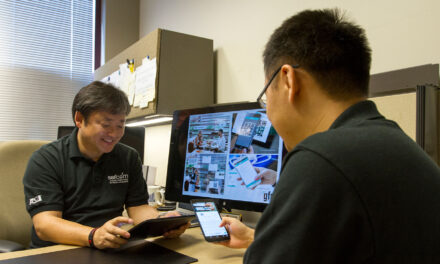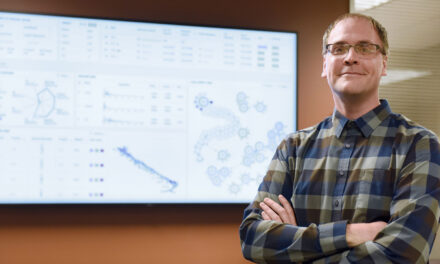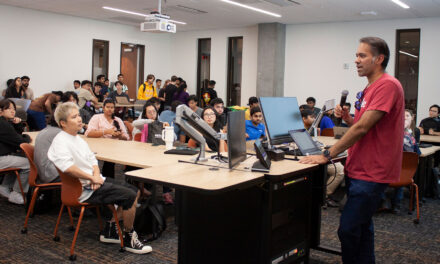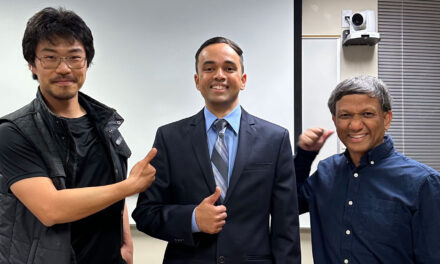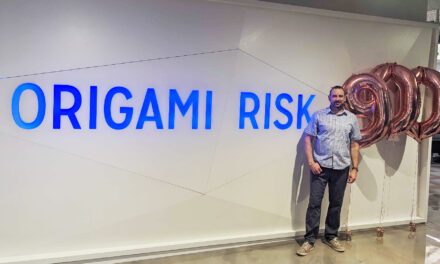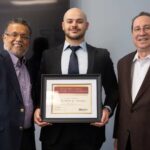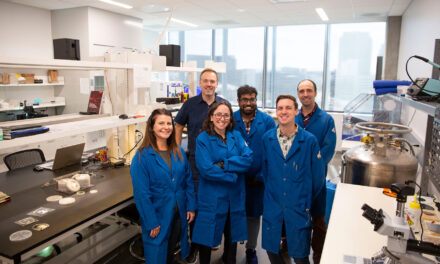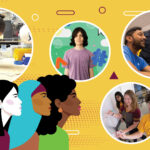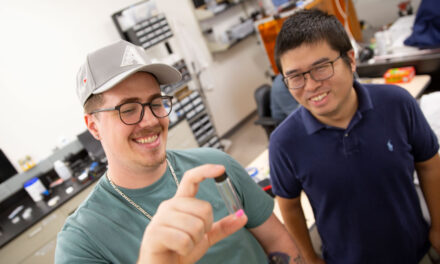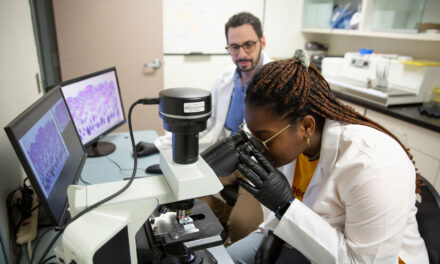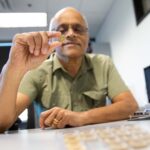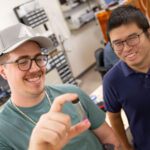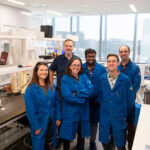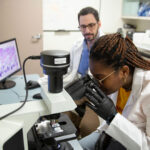
U.S. News gives online engineering education program high marks
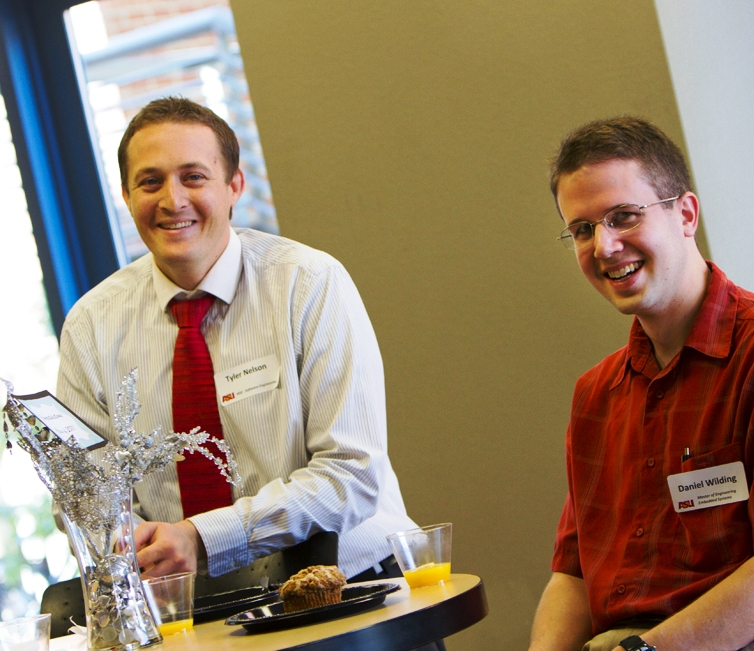
Tyler Nelson (left) and Daniel Wilding recently earned master’s degrees in engineering through the online engineering graduate education program in the Ira A. Fulton Schools of Engineering at Arizona State University. Nelson and Wilding were able to complete their studies while working full-time. Both cite the flexible schedule, relevant course material and the quality of the teaching as reasons they enrolled in the program. Photo by: Jessica Slater/ASU
Posted: January 26, 2012
Online engineering education at Arizona State University’s Ira A. Fulton Schools of Engineering is earning recognition for its quality and innovation.
In recent national rankings by U.S. News & World Report, ASU’s engineering schools place number two for student services and technology provided in an online graduate engineering program. For that ranking category the publication assesses such services as online access to academic advisement and technical support for students, as well as the quality of technological resources used in online teaching.
The program is ranked number 16 in the country in student engagement and accreditation and 17 in faculty credentials and training.
U.S. News and World Report sought data for the rankings from more than 250 institutions with graduate engineering programs accredited by ABET, the leading engineering and technology education accreditation board. The rankings place ASU’s online program at the level of those offered at many of the most prominent engineering schools and colleges.
Industry collaborations
Such rising stature reflects ongoing efforts to improve online graduate engineering education at ASU, says Jeffrey Goss, assistant dean for Global Outreach and Extended Education for the Ira A. Fulton Schools of Engineering.
Emphasis has been put on making the program accessible to working professionals and providing them with degree programs and courses to prepare students for the changing career environment in the engineering professions, Goss says.
The 10-year-old online program stands out for its collaborations with industry and government agencies in developing relevant content for courses.
“We want to ensure students are getting an education that gives them the knowledge and skills that are most in demand in the marketplace,” Goss says.
Eighty-five full-time engineering faculty members teach in the program, which currently has more than 350 students from the United States and several other countries.
Customized education
Students can select from among 10 master’s degree programs and three graduate-level academic certificate programs.
Degree programs include:
• electrical engineering
• engineering science (enterprise systems or software engineering)
• embedded systems
• modeling and simulation
• quality engineering, reliability and statistical engineering
• systems engineering
• industrial engineering
• materials science and engineering
In addition, graduate certificates are offered in statistics, sustainable technology and management, and in nuclear power generation. There are also noncredit professional development programs in systems engineering, as well as Lean and Six Sigma certifications that focus on business-process and product-improvement strategies.
Custom education programs are designed for national and international corporations, government agencies and university partners, and there are educational partnerships with organizations and students in Southeast Asia – including China – South America, Mexico, Costa Rica, and Ireland.
High-quality resources
University of Arizona computer engineering graduate Tyler Nelson, who recently earned a master’s degree in computer software engineering through ASU’s program, says he found the online classes convenient.
“I liked being able to pause the lectures or speed them up, depending on my needs,” he says. “It was easy to turn in homework and I never experienced any technical problems uploading homework or tests.”
Video and audio quality for the online instruction was high-quality, he says, “and I like all the resources provided to students, such as the licenses that enabled us to use new software programs.”
More importantly, Nelson says, “teachers were very understanding of the issues faced by students who have full-time jobs and need to take courses online.”
Nelson earned his degree in two and a half years – taking classes online from his home in southern Arizona, almost 200 miles from ASU’s Tempe campus – and had landed a new job with higher pay by the time he graduated.
Instruction from leading experts
Daniel Wilding says he chose the ASU program over those of several other universities after comparing schedule flexibility, course content and faculty.
“ASU’s best engineering courses are offered online, and I was impressed by the caliber of the professors who teach them. They are experts at the forefront of their fields,” says Wilding, a digital hardware engineer for National Instruments in Texas.
Also appealing was the option to substitute courses to fit individual interests. “I was able to switch to a course in high-performance computing that related more closely to the work I want to do,” he says.
Wilding completed the course work to earn his master’s degree in electrical engineering with an emphasis in embedded systems in 2011 from his home near Austin.
“I found [the program] exciting because all the courses were interesting, and it really deepened my knowledge,” he says. “I’m more current with my field, and now I have extra education that makes me more competitive for technology leadership positions.”
Gaining deeper knowledge
Srikanth Sirobushanam chose to enroll in the online program on the recommendation of engineering colleagues at Intel Corp. in Chandler, Ariz. He is employed in Intel’s manufacturing operations, and returned to college after 12 years working in the industry since earning an undergraduate degree in electrical engineering in his native country of India.
“I want to go deeper into manufacturing equipment development and eventually into research, which requires deep knowledge of electrical engineering and embedded systems,” he says.
While continuing to work full-time, Sirobushanam earned a master’s degree in 2011 in embedded systems through ASU’s online engineering program.
“With the master’s degree I have a strong toe-hold in this domain, and now I plan in a year or two to pursue a doctoral degree in this area,” he says.
Ensuring improvements
There are plans to expand education offerings with the launch of online studies for a degree in engineering management. It will focus on leadership education, including training in skills necessary for project collaborations with partners in professions outside of engineering, and doing business in the global marketplace.
In the next year the engineering schools’ Global Outreach and Extended Education office will be implementing new methods to ensure continued improvement in the online engineering education program, Goss says.
The effort will include providing more options for training faculty in online teaching skills, and more and better ways for students to engage in the program on an individual basis.
For more information, visit ASUEngineeringOnline.com. For information on the U.S. News & World Report rankings, click here and here.


